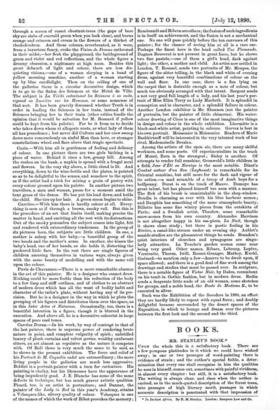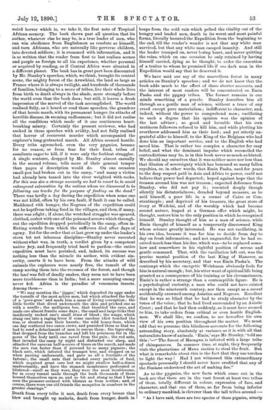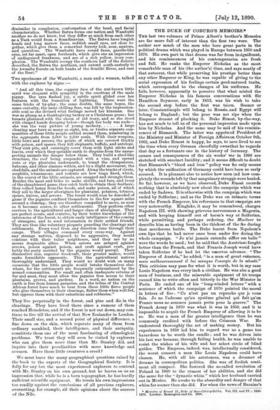BOOKS.
MR. STANLEY'S BOOK.*
UPON the whole this is a satisfactory book. There are a few pompous platitudes in it which we could have wished away ; in one or two passages of word-painting there is evidence of strain ; and the author's special foible, a deter- mination that every one shall recognise in him the qualities he sees in himself, comes out, sometimes with painful vividness, in almost every chapter : but still., it is a satisfactory book. The writing is always clear, and rises when the author is excited, as in the much-quoted description of the forest trees, into passages of high literary merit, passages in which accurate description is penetrated with that impression of
• In Darkest Africa. By H. H. Stanley. London : Sampson Low and 00..
weird horror which is, we take it, the first note of Tropical African scenery. The book shows past all question that its
author, whatever else he may be, is a true leader of men, who can win obedience from Englishmen as resolute as himself, and turn Africans, who are naturally like perverse children, into devoted soldiers; it is crammed with information, and it is so written that the reader from first to last realises scenes and people as foreign to all his experience, whether personal or acquired by reading, as if Central Africa were situated in a different planet. The book has in great part been discounted by Mr. Stanley's speeches, which, we think, brought its central scene, the mighty forest of the Aruwhimi, the land as large as France where it is always twilight, and hundreds of thousands of families, belonging to a score of tribes, live their whole lives from birth to death always in the shade, more strongly before the world even than the book does ; but still, it leaves a fresh impression of the marvel of the task accomplished. The world realised fully, as it heard or read those speeches, the grandeur of that heroic manh, with its permanent hunger, its attacks of horrible disease, it seeming endlessness; but it did not realise all the condition' which made of it one continuous heart- breaking misery. Certainly the present reviewer, who had
sucked in those speeches with avidity, bad not fully realised that horror of recurrent murder which accompanied the explorer's long-protracted march. All Africa seemed hostile.
Every tribe approached, even the very pygmies, became for no reason, or from fear for their food, tribes of assailants eager to kill, if it were only the feeblest straggler. A single sentere, dropped by Mr. Stanley almost casually
in the second /volume, tells more of their general temper than pages tot description would do. On one occasion small-pox had broken out in the camp, "and many a victim had already been tossed into the river weighted with rocks. For this was afro a strange necessity we had to resort to, to avoid subsequent eaciumation by the natives whom we discovered to be
following ou? tracks for the purpose of feeding on the dead."
There was hirdly a day during the expedition when some one was not killid, often by his own fault, if fault it can be called. Maddened with hunger, the Negroes of the expedition could not be keptfrom taking food in the villages, and then, if many, there was a fight ; if alone, the wretched straggler was speared, clubbed, or shot with one of the poisoned arrows which through- out the expedition dropped periodically in the camp, often in- flicting %muds from which the sufferers died after days of agony. ut for the order that at last grew up under the leader's stern bat not inhuman discipline—Stanley never executed without what was, in truth, a verdict given by a competent native jury, and frequently tried hard to pardon—the entire expeditbn must have perished, and, indeed, its success was nothing less than the miracle its author, with evident sin- cerity, asserts it to have been. From the attacks of wild animals the explorers were nearly free, the tumult of the camp scaring them into the recesses of the forest, and though the land was full of deadly snakes, they seem not to have been more tmublesome than in India ; but a more annoying enemy never led. Africa is the paradise of venomous insects. Among them-
" Wi may mention the jigger,' which deposited its eggs under the toenails of the most active men, but which attacked the body of a "goee-goee ' and made him a mass of living corruption ; the little beetle that dived underneath the skin and pricked one as with a needle ; the mellipona bee, that troubled the eyes, and made one almost frantic some days ; the small and large ticks that insidiously sucked one's small store of blood ; the wasps, which stung one into a raging fever if some careless idiot touched the tree, or shouted near their haunts; the wild honey-bees, which one day scattered two canoe crews, and punished them so that we had to send a detachment of men to rescue them; the tiger-slug, that dropped from the branches and left his poisonous fur in the pores of the body until one raved from the pain ; the red ants, that invaded the camp by night and disturbed our sleep, and attacked the caravan half-a-score of times on the march, and made the men run faster than if pursued by so many pigmies ; the black ants, which infested the trumpet tree, and dropped on us when passing underneath, and gave us all a foretaste of the Inferno ; the small ants that invaded every particle of food, which required great care lest we might swallow half-a-dozen inadvertently, and have the stomach membranes perforated or blistered—small as they were, they were the most troublesome, for in every tunnel made through the bush thousands of them housed themselves upon us, and so bit and stung us that I have seen the pioneers covered with blisters as from nettles; and, of course, there were our old friends the mosquitos in numbers in the greater clearings."
Death from every tribe it met, death from every breeze that blew and brought up malaria, death from hunger, death in heaps from the cold rain which pelted the vitality out of the hungry and loaded men, death in its worst and most painful forms, literally haunted the Expedition from the beginning to the end, till the reader's wonder is not that any white man survived, but that any white man escaped insanity. And still the leader tramped on, never losing heart, and never quitting the reins, which on one occasion he only retained by having himself carried, dying as he thought, to order the execution of a traitor to whom he promised life if one dark man in the Expedition would say that he deserved it.
We have said our say of the marvellous forest in many articles on Stanley's speeches ; and we do not know that the book adds much to the effect of those shorter accounts, and the interest of most readers will be concentrated on Emin Pasha and the pygmy tribes. The former remains in our minds something of a puzzle. Stanley describes him all through as a gentle man of science, without a trace of any creed except pure materialism ; indifferent to character, and, indeed, without the power to comprehend men ; vacillating to such a degree that his opinion was the opinion of the last adviser ; so good and loveable that his own mutinous followers refused to kill him, and while plotting his overthrow addressed him as their lord ; and yet utterly an- grateful alike to himself, to the King of the Belgians who had done him an important service, and to the English who had saved him. That is rather too complex a character for easy belief, and what the dominant impulse which reconciled the contradictions may be, is in this book never so much as hinted. We should say ourselves that it was neither more nor less than. that illusion of sovereignty which has bemused so many fallen royalties, or, in other words, that Emin Pasha, used for years to the deep respect paid in Asia and Africa to power, could not believe that power had departed; hoped against hope that the treason around him was not treason ; expected deference from Stanley, who did not pay it ; resented deeply though silently his dictatorialness ; dreaded beyond measure, as he said himself, a poor life in a corner of Cairo or Con- stantinople; and deprived of his treasure, the great store of ivory at Wadelai, and of the worship which had become second nature, leaped at a German offer which might, he thought, restore him to the only position in which he recognised himself. Stanley thought of him as a man of science, while Emin thought of himself as a temporarily discrowned King whom science greatly interested. He was not vacillating, in his own idea, because it was for him to decide from day to day on fresh information ; and not ungrateful, for he had re- ceived much less than his due, which was—to be replaced some- how and somewhere in his rightful position of serene and gentle command. That, with the vacillation left out, was the precise mental position of the last King of Hanover, as described by his secretary, and that was Emin Pasha's. The contempt which the energetic Welshman obviously feels for him is natural enough ; but, his utter want of spiritual life being granted as a consequence of his training or his circumstances, Emin's is rather a strange than a contemptible figure. He is a psychological curiosity, a man who could not have existed except in the nineteenth century, nor then except as a savant accidentally crowned among Asiatics and Negroes. Recollect that he was so blind that he had to study character by the tones of the voice; that he had lived surrounded by an Asiatic Court ; and that he had then suddenly, as it must have seemed to him, to take orders from critical or even hostile English- men. We shall like, we confess, to see hereafter his own view of his own position throughout the matter. We must. add that we presume this blindness accounts for the following astounding story, absolutely at variance as it is with all that naturalists know of animals. Emin,' says Mr. Stanley, 'told me this :'—" The forest of Msongwa is infested with a large tribe of chimpanzees. In summer time, at night, they frequently visit- the plantations of Mswa station to steal the fruit. But what is remarkable about this is the fact that they use torches to light the way ! Had I not witnessed this extraordinary spectacle personally I should never have credited that any of the Simians understood the art of making fire."
As to the pygmies, the new facts which come out in the book are that there are in the vast forest at least two tribes of them, totally different in colour, expression of face, and character, and that one of them, so far from being inferior to ordinary mankind, is cleverer than the tall tribes around :-- " As I have said, there are two species of these pigmies, utterls dissimilar in complexion, conformation of the head, and facial characteristics. Whether Batwa forms one nation and Wambutti another we do not know, but they differ as much from each other as a Turk would from a Scandinavian. The Batwa have longish heads and long narrow faces, reddish small eyes, set close to- gether, which give them a somewhat ferrety look, sour, anxious, and querulous. The Wambutti have round faces, gazelle-like eyes, set far apart, open foreheads, which give one an impression of undisguised frankness, and are of a rich yellow, ivory com- plexion. The Wambutti occupy the southern half of the district described, the Batwa the northern, and extend south-easterly to the Awamba forests on both banks of the Semliki River, and east of the Ituri."
Two specimens of the Wambutti, a man and a woman, talked with the explorer by signs :—
"And all this time, the coppery face of the nut-brown little maid was eloquent with sympathy in the emotions of the male pigmy. Her eyes flashed joy, a subtle spirit glided over her features with the transition of lightning. There were the same tricks of by-play; the same doubts, the same hopes, the same curiosity, the same chilling fear, was felt by the impression- able soul as she divined what feelings moved her kinsman. She was as plump as a thanksgiving turkey or a Christmas goose; her breasts glistened with the sheen of old ivory, and as she stood with clasped hands drooping below—though her body was nude— she was the very picture of young modesty A large clearing may have as many as eight, ten, or twelve separate com- munities of these little people settled around them, numbering in the aggregate from 2,000 to 2,500 souls. With their weapons, little bows and arrows, the points of which are covered thickly with poison, and spears, they kill elephants, buffalo, and antelope. They sink pits, and cunningly cover them with light sticks and leaves, over which they sprinkle earth to disguise from the unsus- pecting animals the danger below them. They build a shed-like structure, the roof being suspended with a vine, and spread nuts or ripe plantains underneath, to tempt the chimpanzees, baboons, and other simians within, and by a slight movement, the shed falls, and the animals are captured. Along the tracks of civets, mephitis, ichneumons, and rodents are bow traps fixed, which, in the scurry of the little animals, are snapped and strangle them. Besides the meat and hides to make shields, and furs, and ivory .of the slaughtered game, they catch birds to obtain their feathers; they collect honey from the woods, and make poison, all of which they sell to the larger aborigines for plantains, potatoes, tobacco, spears, knives, and arrows. The forest would soon be denuded of game if the pigmies confined themselves to the few square miles around a clearing; they are therefore compelled to move, as soon as it becomes scarce, to other settlements. They perform other services to the agricultural and larger class of aborigines. They are perfect scouts, and contrive, by their better knowledge of the • intricacies of the forest, to obtain early intelligence of the coming of strangers, and to send information to their settled friends. They are thus like voluntary picquets guarding the clearings and settlements. Every road from any direction runs through their camps. Their villages command every cross-way. Against any strange natives, disposed to be aggressive, they would combine with their taller neighbours, and they are by no means despicable allies. When arrows are arrayed against arrows, poison against poison, and craft against craft, pro- bably the party assisted by the pigmies would prevail. Their diminutive size, superior woodcraft, their greater malice, would snake formidable opponents. This the agricultural natives thoroughly understand. They would no doubt wish on many occasions that the little people would betake themselves else- where, for the settlements are frequently outnumbered by the nomad communities. For small and often inadequate returns of fur and meat, they must allow the pigmies free access to their plantains, groves, and gardens. In a word, no nation on the earth is free from human parasites, and the tribes of the Central African forest have much to bear from these little fierce people who glue themselves to their clearings, flatter them when well fed, but oppress them with their extortions and robberies."
They live perpetually in the forest, and pine and die in the clearings. They have lived there since a rumour of them reached Herodotus, and if the forest is not cut down, may con- tinue to live till the arrival of that New Zealander in London. Their small size, and a second point of physical difference, a fine down on the skin, which separate many of them from -ordinary mankind, their intelligence, and their antiquity, constitute them one of the most fascinating of ethnological problems. We trust they will soon be visited by explorers who can give them more time than Mr. Stanley did, and inquire into their peculiarities with more knowledge and acumen. Have these little creatures a creed P We must leave the many geographical questions raised by the book to the experts of the Geographical Society. It is folly for any but the most experienced explorers to contend with Mr. Stanley on his own ground, but he leaves on us an impression that, while he is a born topographer, he has hardly sufficient scientific equipment. He trusts his own impressions too readily against the conclusions of all previous explorers, oversetting, for example, all their opinions about the sources of the Nile.




































 Previous page
Previous page